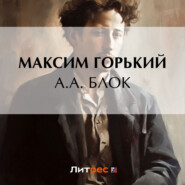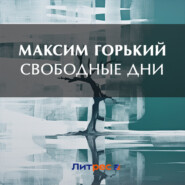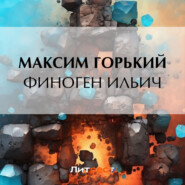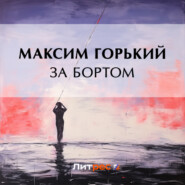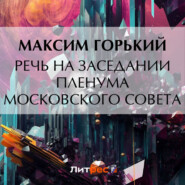По всем вопросам обращайтесь на: info@litportal.ru
(©) 2003-2025.
✖
The Man Who Was Afraid
Настройки чтения
Размер шрифта
Высота строк
Поля
At Yozhov’s he found a shaggy fellow sitting on the lounge. He had on a blouse and gray pantaloons. His face was swarthy, as though smoked, his eyes were large, immobile and angry, his thick upper lip was covered with a bristle-like, soldier moustache. He was sitting on the lounge, with his feet clasped in his huge arms and his chin resting on his knees. Yozhov sat sideways in a chair, with his legs thrown across the arm of the chair. Among books and newspapers on the table stood a bottle of vodka and there was an odour of something salty in the room.
“Why are you tramping about?” Yozhov asked Foma, and, nodding at him, said to the man on the lounge: “Gordyeeff!”
The man glanced at the newcomer and said in a harsh, shrill voice: “Krasnoshchokov.”
Foma seated himself on a corner of the lounge and said to Yozhov:
“I have come to stay here over night.”
“Well? Go on, Vasily.”
The latter glanced at Foma askance and went on in a creaking voice:
“In my opinion, you are attacking the stupid people in vain. Masaniello was a fool, but what had to be performed was done in the best way possible. And that Winkelried was certainly a fool also, and yet had he not thrust the imperial spears into himself the Swiss would have been thrashed. Have there not been many fools like that? Yet they are the heroes. And the clever people are the cowards. Where they ought to deal the obstacle a blow with all their might they stop to reflect: ‘What will come of it? Perhaps we may perish in vain?’ And they stand there like posts – until they breathe their last. And the fool is brave! He rushes headforemost against the wall – bang! If his skull breaks – what of it? Calves’ heads are not dear. And if he makes a crack in the wall the clever people will pick it open into gates, will pass and credit themselves with the honour. No, Nikolay Matveyich, bravery is a good thing even though it be without reason.”
“Vasily, you are talking nonsense!” said Yozhov, stretching his hand toward him.
“Ah, of course!” assented Vasily. “How am I to sip cabbage soup with a bast shoe? And yet I am not blind. I can see. There is plenty of brains, but no good comes of it. During the time the clever people think and reflect as to how to act in the wisest way, the fools will down them. That’s all.”
“Wait a little!” said Yozhov.
“I can’t! I am on duty today. I am rather late as it is. I’ll drop in tomorrow – may I?”
“Come! I’ll give a roasting!”
“That’s exactly your business.”
Vasily adjusted himself slowly, rose from the lounge, took Yozhov’s yellow, thin little hand in his big, swarthy paw and pressed it.
“Goodbye!”
Then he nodded toward Foma and went through the door sideways.
“Have you seen?” Yozhov asked Foma, pointing his hand at the door, behind which the heavy footsteps still resounded.
“What sort of a man is he?”
“Assistant machinist, Vaska Krasnoshchokov. Here, take an example from him: At the age of fifteen he began to study, to read and write, and at twenty-eight he has read the devil knows how many good books, and has mastered two languages to perfection. Now he’s going abroad.”
“What for?” inquired Foma.
“To study. To see how people live there, while you languish here – what for?”
“He spoke sensibly of the fools,” said Foma, thoughtfully.
“I don’t know, for I am not a fool.”
“That was well said. The stupid man ought to act at once. Rush forward and overturn.”
“There, he’s broken loose!” exclaimed Yozhov. “You better tell me whether it is true that Mayakin’s son has returned?”
“Yes.”
“Why do you ask?”
“Nothing.”
“I can see by your face that there is something.”
“We know all about his son; we’ve heard about him.”
“But I have seen him.”
“Well? What sort of man is he?”
“The devil knows him! What have I to do with him?”
“Is he like his father?”
“He’s stouter, plumper; there is more seriousness about him; he is so cold.”
“Which means that he will be even worse than Yashka. Well, now, my dear, be on your guard or they will suck you dry.”
“Well, let them do it!”
“They’ll rob you. You’ll become a pauper. That Taras fleeced his father-in-law in Yekateringburg so cleverly.”
“Let him fleece me too, if he likes. I shall not say a word to him except ‘thanks.’”
“You are still singing that same old tune?”
“Yes.”
“To be set at liberty.”
“Yes.”
“Drop it! What do you want freedom for? What will you do with it? Don’t you know that you are not fit for anything, that you are illiterate, that you certainly cannot even split a log of wood? Now, if I could only free myself from the necessity of drinking vodka and eating bread!”
Yozhov jumped to his feet, and, stopping in front of Foma, began to speak in a loud voice, as though declaiming:
“I would gather together the remains of my wounded soul, and together with the blood of my heart I would spit them into the face of our intelligent society, the devil take it! I would say to them:
‘You insects, you are the best sap of my country! The fact of your existence has been repaid by the blood and the tears of scores of generations of Russian people. O, you nits! How dearly your country has paid for you! What are you doing for its sake in return? Have you transformed the tears of the past into pearls? What have you contributed toward life? What have you accomplished? You have permitted yourselves to be conquered? What are you doing? You permit yourselves to be mocked.’”
He stamped his feet with rage, and setting his teeth together stared at Foma with burning, angry looks, and resembled an infuriated wild beast.
“I would say to them: ‘You! You reason too much, but you are not very wise, and you are utterly powerless, and you are all cowards! Your hearts are filled up with morality and noble intentions, but they are as soft and warm as feather beds; the spirit of creativeness sleeps within them a profound and calm sleep, and your hearts do not throb, they merely rock slowly, like cradles.’ Dipping my finger in the blood of my heart, I would smear upon their brows the brands of my reproaches, and they, paupers in spirit, miserable in their self-contentment, they would suffer. Oh, how they would suffer! My scourge is sharp, my hand is firm! And I love too deeply to have compassion! They would suffer! And now they do not suffer, for they speak of their sufferings too much, too often, and too loud! They lie! Genuine suffering is mute, and genuine passion knows no bounds! Passions, passions! When will they spring up in the hearts of men? We are all miserable because of apathy.”
“Why are you tramping about?” Yozhov asked Foma, and, nodding at him, said to the man on the lounge: “Gordyeeff!”
The man glanced at the newcomer and said in a harsh, shrill voice: “Krasnoshchokov.”
Foma seated himself on a corner of the lounge and said to Yozhov:
“I have come to stay here over night.”
“Well? Go on, Vasily.”
The latter glanced at Foma askance and went on in a creaking voice:
“In my opinion, you are attacking the stupid people in vain. Masaniello was a fool, but what had to be performed was done in the best way possible. And that Winkelried was certainly a fool also, and yet had he not thrust the imperial spears into himself the Swiss would have been thrashed. Have there not been many fools like that? Yet they are the heroes. And the clever people are the cowards. Where they ought to deal the obstacle a blow with all their might they stop to reflect: ‘What will come of it? Perhaps we may perish in vain?’ And they stand there like posts – until they breathe their last. And the fool is brave! He rushes headforemost against the wall – bang! If his skull breaks – what of it? Calves’ heads are not dear. And if he makes a crack in the wall the clever people will pick it open into gates, will pass and credit themselves with the honour. No, Nikolay Matveyich, bravery is a good thing even though it be without reason.”
“Vasily, you are talking nonsense!” said Yozhov, stretching his hand toward him.
“Ah, of course!” assented Vasily. “How am I to sip cabbage soup with a bast shoe? And yet I am not blind. I can see. There is plenty of brains, but no good comes of it. During the time the clever people think and reflect as to how to act in the wisest way, the fools will down them. That’s all.”
“Wait a little!” said Yozhov.
“I can’t! I am on duty today. I am rather late as it is. I’ll drop in tomorrow – may I?”
“Come! I’ll give a roasting!”
“That’s exactly your business.”
Vasily adjusted himself slowly, rose from the lounge, took Yozhov’s yellow, thin little hand in his big, swarthy paw and pressed it.
“Goodbye!”
Then he nodded toward Foma and went through the door sideways.
“Have you seen?” Yozhov asked Foma, pointing his hand at the door, behind which the heavy footsteps still resounded.
“What sort of a man is he?”
“Assistant machinist, Vaska Krasnoshchokov. Here, take an example from him: At the age of fifteen he began to study, to read and write, and at twenty-eight he has read the devil knows how many good books, and has mastered two languages to perfection. Now he’s going abroad.”
“What for?” inquired Foma.
“To study. To see how people live there, while you languish here – what for?”
“He spoke sensibly of the fools,” said Foma, thoughtfully.
“I don’t know, for I am not a fool.”
“That was well said. The stupid man ought to act at once. Rush forward and overturn.”
“There, he’s broken loose!” exclaimed Yozhov. “You better tell me whether it is true that Mayakin’s son has returned?”
“Yes.”
“Why do you ask?”
“Nothing.”
“I can see by your face that there is something.”
“We know all about his son; we’ve heard about him.”
“But I have seen him.”
“Well? What sort of man is he?”
“The devil knows him! What have I to do with him?”
“Is he like his father?”
“He’s stouter, plumper; there is more seriousness about him; he is so cold.”
“Which means that he will be even worse than Yashka. Well, now, my dear, be on your guard or they will suck you dry.”
“Well, let them do it!”
“They’ll rob you. You’ll become a pauper. That Taras fleeced his father-in-law in Yekateringburg so cleverly.”
“Let him fleece me too, if he likes. I shall not say a word to him except ‘thanks.’”
“You are still singing that same old tune?”
“Yes.”
“To be set at liberty.”
“Yes.”
“Drop it! What do you want freedom for? What will you do with it? Don’t you know that you are not fit for anything, that you are illiterate, that you certainly cannot even split a log of wood? Now, if I could only free myself from the necessity of drinking vodka and eating bread!”
Yozhov jumped to his feet, and, stopping in front of Foma, began to speak in a loud voice, as though declaiming:
“I would gather together the remains of my wounded soul, and together with the blood of my heart I would spit them into the face of our intelligent society, the devil take it! I would say to them:
‘You insects, you are the best sap of my country! The fact of your existence has been repaid by the blood and the tears of scores of generations of Russian people. O, you nits! How dearly your country has paid for you! What are you doing for its sake in return? Have you transformed the tears of the past into pearls? What have you contributed toward life? What have you accomplished? You have permitted yourselves to be conquered? What are you doing? You permit yourselves to be mocked.’”
He stamped his feet with rage, and setting his teeth together stared at Foma with burning, angry looks, and resembled an infuriated wild beast.
“I would say to them: ‘You! You reason too much, but you are not very wise, and you are utterly powerless, and you are all cowards! Your hearts are filled up with morality and noble intentions, but they are as soft and warm as feather beds; the spirit of creativeness sleeps within them a profound and calm sleep, and your hearts do not throb, they merely rock slowly, like cradles.’ Dipping my finger in the blood of my heart, I would smear upon their brows the brands of my reproaches, and they, paupers in spirit, miserable in their self-contentment, they would suffer. Oh, how they would suffer! My scourge is sharp, my hand is firm! And I love too deeply to have compassion! They would suffer! And now they do not suffer, for they speak of their sufferings too much, too often, and too loud! They lie! Genuine suffering is mute, and genuine passion knows no bounds! Passions, passions! When will they spring up in the hearts of men? We are all miserable because of apathy.”












